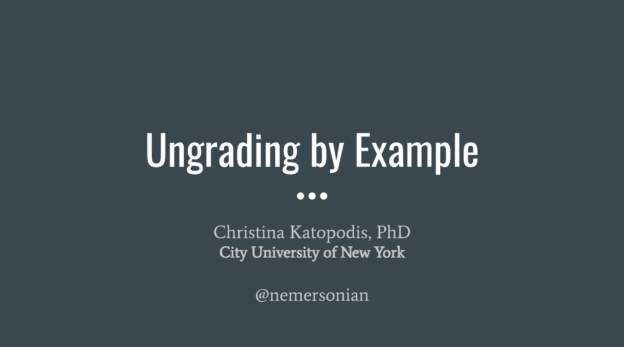On Tuesday, September 14th, we held virtual TLH Open Office Hours with the Mellon TLH Faculty Fellows. We had 11 participants, who shared their experiences with grading and ungrading (alternative forms of assessment).
Some of the challenges discussed included the tedium of grading in Blackboard; helping students understand how scaffolding works (and that missed assignments can snowball into weaker bigger-stakes assignments); guiding student decisions in co-created assessments; and, more generally, increasing student engagement and self-motivation.
Faculty also shared useful tips and strategies, such as:
- talking students through HOW and WHY a given type of assessment or type of assignment works can help them understand the mechanics and gain a grasp of how syllabi and even institutions function–learn the unspoken rules and how to navigate them, an especially important skill for those who feel underprepared for college;
- using group work (and peer review) to help extroverted students manage their speaking-time and help shier students open up (e.g., put all of the “extroverts” in one group and all the “introverts” in a different group);
- asking students to set goals and learning outcomes for themselves at the beginning of the semester and, later, asking them to self-assess how close they came to achieving those goals (individual and/or collective) by the end of the semester;
- making connections between the course content and students lives (e.g., ask students what they are most curious about).
I also presented a brief slide deck with some examples of ungrading, which you can view here.

Resources
Mellon TLH Faculty Fellow Michael L. J. Greer kindly shared some further resources with me after the workshop:
- an article about self-grading that she used as inspiration for her own ungrading methods (he students do a self-assessment which counts for 15% of their final grade) https://www.hsmitchellbuck.com/2019/08/14/adventures-in-ungrading/
- a resource on alternative grading that has been circulating in graduate student circles: https://docs.google.com/document/d/149qAwct6amhY1YnDIxjDKw_6w0AkfpV8hMg515LPRzU/edit
If you’d like to dive in further this semester, there is an #Ungrading Edcamp happening this November 4-6, 2021 (registration is free and the agenda will be informed by what participants are most interested in, so sign up and add your thoughts here).
For further reading, see:
- Ungrading: Why Rating Students Undermines Learing (and What to Do Instead), edited by Susan D. Blum [Book; opens in new window]
- “Ungrading: An Introduction,” Jesse Stommel [Blog; opens in new window]
- “The Case Against Grades,” Alfie Kohn [Blog; opens in new window]
- “A Unilateral Grading Contract to Improve Learning and Teaching,” Jane Danielewicz and Peter Elbow [JSTOR; opens in new window]
- An Urgency of Teachers, the Work of Critical Digital Pedagogy, edited by Sean Michael Morris and Jesse Stommel [Open access book available; opens in new window]
- “Beyond the Curriculum,” Aaron Blackwelder [Podcast; opens in new window]
- “Reimagining the Grading Contract to “Ungrade” with Prof. Eidum,” Tatiana Ades [HASTAC interview; opens in new window]
- “Navigating Racism: The Profound (and Useful) “Navigational Log” of Prof Molly Appel of Nevada State College,” Cathy N. Davidson [HASTAC interview; opens in new window]
- “Getting Started: Contract Grading and Peer Review,” Cathy N. Davidson [HASTAC blog; opens in new window]
- “Classrooms and Social Justice: Why Start with Pedagogy?” Siqi Tu [Futures Initiative blog; opens in new window]
- “Ask Students to Write the Final Exam,” Christina Katopodis [Blog; opens in new window]


